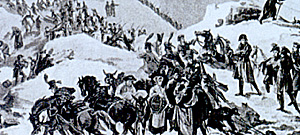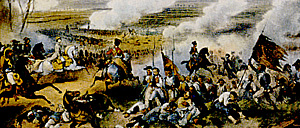 Napoleon's counter-offensive over the Alps in the Spring of 1800 (see inset) caught the Austrians out of position in northern Italy. Despite this strategic advantage, the Austrians in turn surprised Bonaparte at Marengo on 14 June, depicted here by Carle Vernet. (Vernet was a distinguished painter of battle scenes who was awarded the Legion of Honor for his panorama of Austerlitz. Courtesy Anne S. K. Brown Military Collection, Brown University, Rhode Island.). Fortunately for First Consul Bonaparte, his army and career were rescued by the timely counter-attacks of Generals Desaix and Kellermann.
Napoleon's counter-offensive over the Alps in the Spring of 1800 (see inset) caught the Austrians out of position in northern Italy. Despite this strategic advantage, the Austrians in turn surprised Bonaparte at Marengo on 14 June, depicted here by Carle Vernet. (Vernet was a distinguished painter of battle scenes who was awarded the Legion of Honor for his panorama of Austerlitz. Courtesy Anne S. K. Brown Military Collection, Brown University, Rhode Island.). Fortunately for First Consul Bonaparte, his army and career were rescued by the timely counter-attacks of Generals Desaix and Kellermann.
Early in 1800, First Consul Bonaparte conceived a bold plan to reverse France's precarious military position in Italy. This would be his second campaign over familiar territory -- four years before he had won his greatest fame in northern Italy.
Placing himself at the head of the Army of the Reserve (and leaving General Jean Victor Moreau, a potential military and political rival, to defend the German theater), Napoleon crossed the Alps and placed his forces in the rear of the Austrian army besieging the unyielding Massena in Genoa. Few operations since Hannibal's own crossing of the Alps, two thousand years earlier, had boasted such audacity. Napoleon's harrowing passage of the frozen St. Bernard pass became a popular subject.
 Near the strategic fortress of Alessandria, Napoleon confronted the Austrian army under General Michael Friedrich Benoit Melas. The resulting Battle of Marengo appeared for most of the day to be a French defeat. A disconsolate First Consul helplessly watched as the Austrians, who heavily outnumbered his forces in artillery and cavalry, drove his army back. By mid-afternoon, General Melas, believing the French to be in full retreat, ordered a pursuit and left the field. But the arrival of French General Louis Charles Desaix and his division enabled the French to rally. In a dramatic stand, Desaix's infantry checked the advance of 5,000 elite Austrian Grenadiers. At the height of the firefight Desaix was mortally wounded and the French wavered.
Near the strategic fortress of Alessandria, Napoleon confronted the Austrian army under General Michael Friedrich Benoit Melas. The resulting Battle of Marengo appeared for most of the day to be a French defeat. A disconsolate First Consul helplessly watched as the Austrians, who heavily outnumbered his forces in artillery and cavalry, drove his army back. By mid-afternoon, General Melas, believing the French to be in full retreat, ordered a pursuit and left the field. But the arrival of French General Louis Charles Desaix and his division enabled the French to rally. In a dramatic stand, Desaix's infantry checked the advance of 5,000 elite Austrian Grenadiers. At the height of the firefight Desaix was mortally wounded and the French wavered.
At this precise moment, one of the most remarkable cavalry charges in history took place. General Francois Etienne Kellermann (son of the hero of Valmy) approached the Austrian column apparently undetected and, with about 300 cavalry, pitched into the flank of the surprised grenadiers. Within minutes, thousands of Austrians either surrendered or routed. The battle had turned around in an instant, glory retrieved from abject defeat. Napoleon's career had been saved. Sadly, Napoleon could never admit his debt of gratitude to Kellermann, instead finding it politically necessary to alter the reports on the battle to make it look as if the victory at Marengo was a result of his brilliant planning, downplaying the fortuitous efforts of his daring subordinates.
Although Marengo was a victory of enormous consequence that enabled Napoleon to regain control of Italy, it was not until Moreau's victory at Hohenlinden on 3 December that the Austrians decided to make peace at Luneville in February of 1801.
More Napoleon: Introductory Guide
-
Introduction
Prejudice and Pride
Napoleon in Military School
The Young Artillerist's Double Life
Revolution & Opportunity
Women's Fashion During the Revolution
The Siege of Toulon
Napoleon & Josephine
Women's Fashion during the Directory
Fame & Glory: Italy
Fame & Glory: Egypt
Saviour or Usurper
Battle of Marengo
Civil Achievments
Enlightened Despot or Tyrant
Napoleon's Siblings
The Dawn of Gastronomy
Haydn and Beethoven
Women's Fashion during the Empire
Napoleon's Other Women
The Mashalate and Imperial Eagle
History's Greatest General?
Back to Table of Contents -- Napoleon #17
Back to Napoleon List of Issues
Back to MagWeb Master Magazine List
© Copyright 2001 by Napoleon LLC.
This article appears in MagWeb (Magazine Web) on the Internet World Wide Web.
The full text and graphics from other military history magazines and gaming magazines are available at http://www.magweb.com
Order Napoleon magazine direct